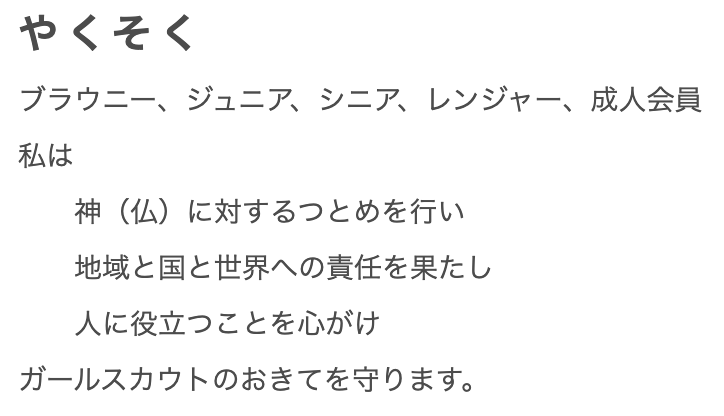About Japanese religion
- Karen Cortez
- Nov 3, 2019
- 5 min read
An extension on my observations on the Japanese P&L: why is Buddha in brackets next to God?

Upon first reading the Japanese promise, the question that jumped into my mind was: is Buddha the Buddhist God? I thought he was just a dude! What duties does he require we do? It all seemed very strange. So I did some research, and here is what I found:
"Buddhism does not include the idea of worshipping a creator god... the basic tenets of Buddhist teaching are straightforward and practical: nothing is fixed or permanent; actions have consequences; change is possible." https://thebuddhistcentre.com/buddhism (accessed Sep 17)
Buddhists do not believe in a God because they consider the evidence of a deity existing to be too negligible at this time (read more here). However, they do believe that every human being has the capacity to become a Buddha:
"We don't believe in a god because we believe in humanity. We believe that each human being is precious and important, that all have the potential to develop into a Buddha - a perfected human being. We believe that humans can outgrow ignorance and irrationality and see things as they really are. We believe that hatred, anger, spite and jealousy can be replaced by love, patience, generosity and kindness." http://www.buddhanet.net/e-learning/qanda03.htm (accessed Sep 17)
This article (https://www.thebuddhistsociety.org/page/the-buddha) breaks down what the term Buddha means, and the different levels of people that it applies to. The most exclusive use of the term Buddha is the Universal Buddha, as they exist one at a time as the founder of Buddhism in this cycle of Buddhism being known to the world.
Therefore, the current Universal Buddha is probably the closest thing Buddhism has to a god since they are a perfected human being that Buddhists look up to for inspiration, but Buddha is definitely not a god.
So we've now unpacked the "God (Buddha)" aspect. Now what about the duty part?
Upon googling "do Buddhists have duties", I found this article by a Buddhist monk and scholar: "Duties of a Lay Buddhist". One paragraph confirmed the role of Buddha in Buddhism, as a source of inspiration.

Any "duties to Buddha" are therefore just acts in service of the Buddha's vision of "a civilised, cultured and peaceful society of intelligent people striving for the attainment of Nibbana – the cessation of Universal Suffering." So it isn't really that Buddha requires us to do any deeds to please him like creator Gods, it is more that Buddhists should join the Buddha in contributing to the vision they believe in.
Many countries have removed the mention of a God in their current promise, unless monotheistic religion is actually still prominent in their communities (many Pasifika islands still have strong religious practices from missionaries, the Philippines is just the Philippines). Knowing that Guiding has been around in Japan for a century, and knowing that 75% of Japan practice some aspect of Buddhism, why keep God in?
Turns out, the Japanese also concurrently practice another religion: Shinto.
Shinto religion
Shinto = “way of the kami”, and kami are the gods. You can read more about them here., but in short, there are three types of kami, nature/abstract spirits, ancestral spirits, and spirits of those were important to Japan - e.g. soldiers.
According to this source by Jill Caroll, Shinto beliefs can be better understood as a “distinct sensibility that underlies an entire approach to life and the world” through the perspective mono no aware, rather than a list of beliefs:
aesthetic sensitivity - a sense of beauty and of the beautiful
sensitivity toward the aesthetic and the emotional as a basis for looking at life - this includes the sadness or pathos of life as well as joy, happiness and bliss
seeing with the heart into the natural beauty and goodness of all things
Shinto religion is also built on the concepts of makoto and kannagara-no-michi, and seems to stand in for the rules, or duties, of bigger religions. Describing makoto, or “sincerity”, Caroll puts it neatly:
“Sincere people do not do things that undermine the fabric of society or bring harm to the community or family. Sincerity is the grounding of all ethical thought and behavior, in this view. Even were the religion to have long lists of dos and don'ts in its archives, only those with sincerity in their hearts will be prompted to live the rules.”
I agree! Why waste printing out rulebooks for people who aren’t sincere anyway? :)
The other phrase, kannagara-no-michi is a bit less clear to me, and Caroll describes it to be “the idea that virtue is inseparable from the rest of life, especially life lived in harmony with the natural world”. Caroll goes on to say that those who live by the above ideals are likely to already be living lives of virtue.
There are no rules to be followed other than being sincere and sensitive, neither of which seem to angle towards an obligation/duty sort of attitude. Is there a duty to be done for the kami?
My answer so far has to be no. According to this source rituals to do with the kami are in an effort to keep away evil spirits, in an acknowledgement that no person is exempt from being affected by evil. Rituals involve purification processes, prayers and offerings, but there doesn't appear to be a sense of owing the kami something or being required by them to do something.
Karen’s possible answer number 1:
The God clause is included because many people concurrently practice both Buddhist and Shinto religions, and the Shinto religion involves belief in and respect of the kami, who are deities from nature and ancestral deities. The “God” in the God clause is a reference to all Shinto kami and the general beliefs of many people in a spiritual world.
Karen’s possible answer number 2:
The promise is considered a tradition in itself, and much like Shinto and Buddhist beliefs can be held simultaneously, the difference between what the promise says about God and what people believe about God doesn’t bother anyone that much.
According to the WAGGGS entry on the Girl Scouts of Japan:
"Girl Scouting was first introduced to Japan by Miss Muriel Greenstreet, a British missionary teacher, in 1919."
Since the Girl Scouts of Japan was formed only 9 years after Guides started, we could assume that it got its P&L roots from the original version.
Japan’s current version seems to follow almost exactly the clauses outlined in the original promise with some changes:
On my honours, I promise that I will do my best: = I promise to:
Interesting that "do my best" is omitted in the current Japanese version. I find this really interesting as I hear a lot of Australian leaders place a LOT of emphasis on this aspect of our promise.
To do my duty to God and my country = Do my duty to God (Buddha); Be responsible for my community, my country and the world
God and country have actually become two clauses as evidenced by the use of semicolons. Perhaps this indicates that doing duty to God and country are not the same actions. Perhaps they also wanted to include the words “be responsible” in reference to community/country/world so that girls are encouraged to move past simply performing required duties.
To help other people at all times = Try to be helpful to other people
This is the only Japanese clause that includes “try”. No conclusions on this yet but interesting that all other clauses are Yoda-style “do or do not” but this one gives you a bit more leeway almost. Perhaps this is because the community clause has been expanded? Potentially because helping people at all times is not actually helpful! Whereas “try to” suggests that you should put yourself forward as someone willing to help.
Obey the Guide Law = Live by the Girl Scout Law.
Allows for more interpretation and encourages the ownership of the Law as a way of conducting yourself at all times. The Law becomes an internal part of you.
PS: Some hunting on the GSJ website for the Promise as written in Japanese confirms that Buddha is indeed in brackets, this was not an addition made by WAGGGS for the benefit of non-Japanese speakers. :)










Comments